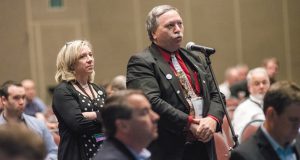Cascades’ new converting plant extends the company’s North American reach and is a boost for local economies.
JAN BOTTIGLIERI
Scappoose is not a town many people could find on a map. Yet its rural Oregon location—20 miles north of Portland and eight miles south of St. Helens—made it the perfect choice as the home of Cascades Inc.’s new converting facility. The state-of-the-art, 284,000-square-foot tissue facility held a public inauguration in July 2017.
The new plant is equipped with best-in-class converting lines, high-speed rewinders and folders, and reportedly one of the fastest bath lines in the world. Cascades’ St. Helens tissue mill supplies the majority of the parent rolls, which the new facility converts into towel and tissue products under the Cascades PROTM brand for U.S. and Canadian away-from-home markets.

Inside Cascades’ new converting facility in Scappoose.
“The completion of this project marks an important milestone for Cascades,” says Jean Jobin, president and chief operating officer of the Cascades Tissue Group. “It has long been our goal to expand our presence within the United States and offer greater quality and flexibility for our customers. This world-class facility is the first step in our plan to modernize our tissue manufacturing and converting equipment and a clear indication of our commitment to this segment.”
Oregon Governor Kate Brown was one of several local dignitaries to speak at the inauguration ceremony.

From left to right: Jean Jobin, president and COO, Cascades Tissue Group; Betsy Johnson, State Senator, Oregon; Mario Plourde, CEO of Cascades; Kate Brown, Governor of Oregon; Tony Hyde, former Columbia County Commissioner; Scott Burge, Mayor of Scappoose; Brad Witt, State House Representative.
“While rural Oregon economies have grown, they have not grown at the pace of urban areas. This facility will help close that gap,” she said, calling the new site “a win for rural Oregon.” Cascades was able to take advantage of a US$500,000 forgivable loan from Business Oregon. Brown added that Cascades’ choice to build in Scappoose underscores the importance of the state’s natural resource economy, especially for wood products.
EXPANDING REACH
Cascades first came to Oregon in 2002, when St. Helens began production. For 15 years, the mill sold parent rolls to a number of clients for converting. “Over time, it became clear that we wanted to strengthen our presence on the West Coast, to better serve customers by converting our own product and selling our own brands,” says Mario Plourde, Cascades’ chief executive officer. He notes that the Scappoose facility gives Cascades a national presence.
“There’s only one company in tissue investing heavily on the West Coast right now and it’s Cascades,” says Jobin. “We have the right people and the right assets. We hope everyone will see this as a firm commitment to the tissue sector on the West Coast.”
The total investment in the Scappoose converting facility was US$64 million. The facility will have a production capacity of nearly six million cases per year of virgin and recycled hand towels and bath tissue.
The facility currently has three converting lines. Cascades planned ahead to make sure the new lines would stay busy, adding a second paper machine at St. Helens in 2014. The new capacity at St. Helens was geared specifically for conversion into hand towels for the AFH market (Cascades PRO line.) The St. Helens mill provides 80-inch diameter jumbo rolls made with virgin or recycled fiber. Forty percent of St. Helens’ capacity will be sent straight to Scappoose, creating considerable synergy for the company. “The logistics for us were really important. With a paper mill less than 10 miles from here, we can convert the product, then all the trim can go right back to the mill and be recycled.”

Single roll bath tissue on Line 2 at Scappoose.
With a zero-incident safety record (see sidebar) and world-class equipment, the plant is already making a strong showing. Supplier relationships are part of the story. “Our goal is not to squeeze suppliers for the best price, then run their machine. They’re part of our success, and they know that,” says Plourde. “We had the owner of Bretting (at our inauguration). We have a great relationship with them.”
Converting line Number 3 is a Bretting, adds Jobin. “Bretting told us that the world-class record for changing rolls on that line was three minutes. Our operators achieved 1:55. They beat the record from the supplier multiple times. When I was doing the inauguration tour the operators were all there, and you can see the pride on their faces. That was amazing.”
Plans for expanding the Scappoose facility have been in place since the beginning. The second phase of the project will add three additional converting lines, plus a fully automated warehouse behind the existing facility.
“You have to reduce your risk as a company,” says Jobin. “For instance, right now on Line 1, we make multiple products. That’s not ideal, but we have two emboss stations. When we do Phase 2, we’ll move one of the emboss stations there, to simplify the process of both lines.”
The time frame for building and starting up Phase 2 will depend on how quickly Cascades can push the new capacity into the market. According to Plourde, when the Scappoose plant is running at 80 percent capacity and trending upwards, Phase 2 will begin.
“I think we made the right strategic decision to come here to the West Coast and establish a facility close to our mill,” he says. “I think we chose the right people. I hope the community accepts our product and we’ll be able to expand soon—that’s our goal.”
STAFFING UP
The plant will create 80 permanent jobs (it also created 200 jobs during construction). Typical operator pay ranges between US$20-38 an hour. Cascades also offers a lucrative benefit package, including above-standard health care and a 401k match and profit sharing plan. This was key to securing the local incentives. “These are substantially higher wages than the average in Columbia County, so we’re very pleased,” commented Oregon State Senator Betsy Johnson, who spoke at the inauguration ceremony.
Plourde notes that creating the “Cascades culture” was important. “When we engaged the employees, before the mill was built, we started by talking about our values—what we expect from them as employees, how we expect them to work in the facility and collaborate with their partners. We’re trying to ‘responsibilize’ the employee. If you need a supervisor to supervise an employee to do his job, you’re adding layers to the system. In our view, the employees are capable enough. They are beside these machines day in and day out, they know these machines much better than we do, and their job is to make these machines run as efficiently as possible. Once you achieve this, the manager can concentrate on making the plant more efficient, evaluating new technology, and looking farther forward than just the next day.”

Scappoose Converting Mill Manager Joe Ertolacci.
One of the first hires Cascades made was Joseph Ertolacci, who serves as the Oregon converting facility’s mill manager. He, in turn, selected the plant’s core leadership group, and gave them autonomy to select the people in their group under some basic guiding principles. “We hire virtue over talent,” says Ertolacci.
“What that means is, let’s say I had the best rewinder operator in the area, but they’re difficult to deal with—maybe they don’t want to share their knowledge. That would not be someone who would fit into our family.”
Training began as far back as October 2016, when new hires were sent to Cascades facilities in Canada for training on the same types of equipment the Scappoose plant would be running; they also learned about the values of the corporation. “If you have the values we want, we’re very confident we can train you with the expertise,” says Ertolacci. “Some of our operators were in high school a year ago! Yet we now have some of the best operators in the nation—and I know, because I’ve managed a lot of mills.”
Employee engagement and community involvement are even part of Cascades’ Sustainable Development plan, says Plourde. “As a company, we look at all the different aspects: reducing our gas emissions, reducing our water consumption, reducing our energy, reevaluating all our rejects that we have from our mills—and we set new targets every year. Targets are communicated to the group and to each plant. Each plant is tracked—what it has done to reduce its consumption of water and energy, etc.—and measured on a quarterly basis. If we don’t meet objectives, we consider alternatives,” he says.
The company is designing key process indicators to track community involvement in the same way it tracks other sustainability goals. “In water consumption, we use about 20 percent of the industry average. This is the kind of sustainability that everyone talks about—but for us, there is more,” says Jobin. “This summer
Mario Plourde, our CEO, was riding his bike 85 miles a day, four days in a row, to help kids fight cancer. When it starts from the top, everyone understands that this is who we are.”
At Scappoose, a lobby display highlights this community action. “You’ll see pictures of our local people going to food kitchens—we sponsor a food kitchen once a month. We put value in our people being seen in the community and we measure that,” says Ertolacci.
A LOCAL PARTNERSHIP
Support from the State of Oregon, Colombia County, and the City of Scappoose were integral to the project. With approval from Governor Kate Brown, Business Oregon awarded a US$500,000 loan, which is forgiven if certain job creation and other parameters are met. The funds were used to help purchase and install some of the equipment at Scappoose.
“A few years ago, Cascades Tissue expanded the St. Helens facility, effectively doubling their manufacturing capability and their workforce. That expansion, and this new facility, give me great hope that the manufacturing industry in rural Oregon will continue to grow and prosper,” Governor Brown said at the Scappoose inauguration. “Both of these expansions have a common thread: Strategic Reserve Fund loans (from the state of Oregon). After seeing great returns on our first investment in Cascades, I’m happy to be making a half a million dollar investment and partnering with this company again as they invest millions into a cutting-edge facility employing local workers with good-paying jobs. The folks at Business Oregon did a terrific job working with Cascades.”
Henry Heimuller, chair of the Columbia County Board of Commissioners, acknowledges that it can be controversial for a local government to give incentives to companies to build in their communities. Yet he says, as in business, Columbia County must compete with other markets nationwide. “Cascades is an international company; they can go anywhere they want. We want them in Columbia County,” Heimuller says. “We’re going to continue to put those investments out there to bring more businesses.”
Heimuller explains that Columbia County has a 70 percent commuter rate; that is, about seven out of 10 workers living in the county commute out to their jobs. It’s something his office is looking to change.
“Companies that are sited in Columbia County support Columbia County. Workers who are not spending two hours commuting every day can coach their kids’ ball teams, can volunteer at their church, can be a volunteer firefighter—can do all the things that can make their communities prosper and grow.”
Scappoose Achieves Zero Incident Rate
Anyone who has worked in manufacturing has heard the old saying, “safety doesn’t happen by accident.” It requires management commitment, employee engagement, tested rules and protocols—in short, a lot of work. Yet for those outside the plant, a good safety record isn’t an achievement, it’s an expectation, and they’re only likely to notice when things seem less than perfect.

Master Tech Doug Keizur speaks to a tour group at the inauguration event.
At Scappoose, management and operators take the opposite approach. They celebrate the facility’s stellar safety record, and have created a culture where safety is a top priority. The facility achieved a zero incident rate during the 13-month-long construction phase, and as of press time has maintained the record for 410 days.
“As proud as we are of what has been created here, we are equally proud of our safety performance,” Mill Manager Joe Ertolacci told visitors, local dignitaries, and members of the press at the facility’s July inauguration ceremony. “We take safety very seriously at Cascades, and at the Scappoose converting facility.”
Ertolacci says that, from the beginning, employee involvement has been the key. “We did our best to set a vision where nobody was ever injured and where we’re all responsible for each other. This mentality led us to develop some great initiatives—such as ‘stretch and flex’ sessions where employees take part in light morning workouts together. We then perform safety observations on each other in an environment of caring for each other. It helps people to prepare for a working day, keeps them fit and focused on safety. Our motto is ‘tomorrow is your reward for working safely today.’”
The enthusiasm for safety is evident on the plant floor as well—and the local media has noticed. A recent article in the St. Helens Chronicle quotes Doug Keizur, master tech at Cascades’ Scappoose facility: “While his machine runs quietly in the background, he explains the rigorous safety regime. ‘We review safety operations on a weekly basis,’ he explains. He is obviously proud of the plant’s 279 safe days.”
Tech Specs
At 284,000 square feet for Phase 1 of the project, Cascades’ Oregon Converting facility in Scappoose features state-of-the-art equipment including:
•
Three specialized converting lines:
–
Line 1: PCMC Forte rewinder designed to produce toweling
– Line 2: PCMC Forte rewinder designed to produce bath tissue
– Line 3: Bretting Folder designed to produce multi-fold towel
•
Dust filtration/Dust abatement from Osprey
•
Case Packer Series 3600 from Edson
•
Baler from Global
•
Single Roll Wrapper and Multifold Case Packer from Infinity
•
Pro Log Saw from PCMC
•
Palletizer from Elletric80





 Paper 360
Paper 360


